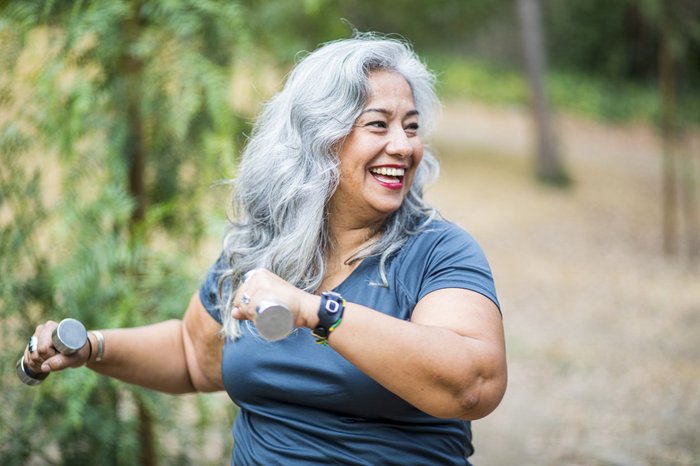The following information is for women with chronic kidney disease (CKD) who are approaching or going through the menopause. It explains how CKD can affect when you go through the menopause, as well as the symptoms that you may experience.
What is the menopause?
The menopause is when you stop having menstrual periods. This usually occurs around the age of 50, but it can occur earlier. It is a gradual process with periods becoming irregular before stopping completely. You are classed as having been through the menopause (be postmenopausal) when you have not had a period for 12 months.
What causes the menopause?
As you get older, your ovaries make less oestrogen, the main female hormone. They also stop producing eggs, so your periods stop, and you are no longer able to get pregnant naturally.
You may go through the menopause early if you have a hysterectomy – the removal of your womb. Your ovaries will continue to make oestrogen but at lower levels than before. If you have your ovaries removed as well then you will go into the menopause immediately. If you go through the menopause before the age of 40 this is known as premature ovarian insufficiency.
Some research has suggested that women with CKD may go through the menopause earl compared to the general population, but this is still being investigated. If your periods stop while you are on dialysis this does not necessarily mean that you are going through menopause, and they may come back if you have a transplant.

What are the symptoms of menopause?
Most women will experience some menopausal symptoms. These may be minor or they can have a big impact on your life. The menopause can cause both physical and psychological symptoms.
Physical
- hot flushes
- night sweats
- headaches
- difficulty sleeping
- aching muscles
- vaginal dryness, which can cause discomfort during sex and itching
- urinary tract infections.
Psychological
- low mood
- irritability
- anxiety
- forgetfulness
- difficulty concentrating.
These symptoms may start several years before your periods eventually stop and can carry on afterwards. They may vary in intensity and can affect people in different ways.
Talk to your GP if you are concerned about any of these symptoms, especially if you are under the age of 45 and your periods have stopped.
How will I know if I am going through the menopause?
Hormone tests can confirm menopause, but these can be misleading if you have advanced kidney disease, as your hormone levels are affected by your drop in kidney function.
If you are over 45 and are experiencing some of the above symptoms, along with a reduction in your periods that is not caused by pregnancy, then it is highly likely that you are going through the menopause. Your GP can confirm this.
What are the long-term effects of menopause?
As your oestrogen levels continue to drop you may find that your skin and hair become dryer and thinner.
The reduction in oestrogen levels that occurs during the menopause may increase your risk of osteoporosis (thinning of the bones). This risk increases if you are on dialysis, which can also lower your hormone levels. The risk also increases if you are on steroid treatment for your kidney condition or if you have had a transplant, due to the anti-rejection drugs that you must take.
The risk of developing heart disease also increases once you go through the menopause as you lose the protective effect of oestrogen. This risk is already higher in those with kidney disease and increases further if you are overweight, have high blood pressure or smoke.
Because of these long-term effects and the pre-existing risk of bone problems and heart disease that comes with CKD, it is important that women with CKD are monitored as they go through the menopause.
Do I still need to use contraception after the menopause?
It is very rare for women over the age of 55 to become pregnant, even if they have not yet gone through the menopause. It is recommended that you continue to use contraception for 12 months if you are over 50 when your periods stop, or 24 months if this happens below the age of 50.
Barrier methods of contraception, such as condoms, should still be used, if necessary, to prevent sexually transmitted infections (STIs), even after the menopause.
How is the menopause treated?
The menopause is a natural process that all women go through and is not something that can be prevented. However, if the symptoms you are experiencing are having a major effect on your life, then there are treatments that can help.
The most commonly used and effective of these is hormone replacement therapy (HRT), which is available as tablets, skin patches, sprays or gels. It works by replacing the oestrogen that your body has stopped producing.
It is an effective treatment for most of the physical symptoms of menopause and also helps keep your bones and heart healthy if started early enough. Women with a womb or a history of endometriosis need to use an additional hormone called progestogen.
Local oestrogen therapy is available as a vaginal tablet, pessary or cream to manage vaginal dryness. This is not absorbed and does not provide the other benefits of HRT such as bone and heart protection. Talk to your GP about the best option for you.

What are the side effects of HRT?
Like all medicines, there are some potential side effects associated with HRT, including breast tenderness and headaches. The most serious complication is an increase in the risk of blood clots with HRT tablets.
It is important that your blood pressure is well controlled and checked regularly.
There is a small increased risk of developing breast cancer for women taking the combined form of HRT, which contains both oestrogen and progestogen.
The normal risk is 23 new cases of breast cancer for every 1,000 menopausal women. For those on combined HRT this increases to 27 cases. That’s an extra four cases per 1,000 women, although the likelihood is that these cancers were already present, but developed more quickly due to the influence of the hormone therapy.
This increased risk decreases after you stop taking HRT. Oestrogen-only HRT is associated with an incidence of four fewer cases of breast cancer per 100 women.
It is important to check your breasts regularly for lumps and attend all your breast cancer screening appointments (mammograms). HRT is usually only used for a few years until most of your symptoms have passed. If you go through the menopause early (younger than 45) you will likely be recommended to stay on it until you reach the ‘normal’ age of menopause, which is 51.
Vaginal oestrogens can be used for as long as needed. There is no need to combine vaginal oestrogen with a progestogen if you have a womb. Lack of oestrogen affecting the lining of the vagina is a condition that deteriorates over time without treatment. Ongoing treatment is important to maintain any beneficial effect achieved.
Is it safe to take HRT if I have CKD?
Yes, in most cases, unless you have uncontrolled high blood pressure. In this case, your blood pressure will need to be controlled before you can start HRT.
HRT may not be suitable for you if you have a history of breast, ovarian or endometrial (womb) cancer, or unexplained vaginal bleeding. Talk to your doctor about your options.
Women with a history of blood clots in the leg or the lung can have HRT, but it should be delivered through the skin as a patch, gel or spray. This also applies to women suffering from liver disease. The progestogen component can be safely taken by mouth.
What non-HRT treatment is available for menopause symptoms?
Dietary and lifestyle changes are important, as well as any other treatment that you choose to take. Reducing the amount of alcohol you drink and stopping smoking will help protect your heart.
Your bones need regular weight-bearing exercise to stay healthy. Impact and muscle strengthening exercises are best. If you are not used to exercise you may want to begin with gentle walks or stair climbs. Activities such as running, skipping, tennis and basketball are good for strengthening your muscles.

To help reduce the risk of osteoporosis, additional dietary calcium or vitamin supplements prescribed by your doctor may be needed. If you have any questions or concerns about this, please talk to your doctor or dietician.
If the psychological symptoms described above are having a major impact on your life, you may wish to try cognitive behavioural therapy (CBT). Your GP can discuss local providers.
There are non-hormonal treatment options for vasomotor symptoms such as hot flushes and night sweats. These include venlafaxine, gabapentin and clonidine. Some herbal medicines such as red clover may reduce menopausal symptoms. However, this plant-based oestrogen (isoflavone) is unlikely to be any safer than prescribed HRT and has not been subjected to robust clinical trials in the same way as the licensed medication that your doctor can prescribe.
In addition, herbal medicines can have serious side effects and they can react with your other medicines. This includes medicines that you have bought over the counter and those that have been prescribed by your doctor, such as anti-rejection drugs if you have had a transplant. There is also the risk of causing inflammation and damage to your kidneys. You should always check with your doctor before taking any herbal treatments.
The menopause is a natural and temporary stage of life for most women. Every woman experiences it differently and it is important to ask for help if you need it. Ask your GP to refer you to a menopause specialist if you would like more specialist support.
More information about the menopause and CKD
- Women’s Health Concern menopause factsheets
- NHS information on menopause
- NICE Guidelines: Menopause
- Royal Osteoporosis Society: the menopause and bone health
- The Menopause Charity
Menopause and kidney disease: download or order Kidney Care UK's information leaflet
You can download our Menopause and kidney disease leaflet for free.
You can also order a printed copy of Kidney Care UK’s Menopause and kidney disease leaflet to be sent to you in the post.